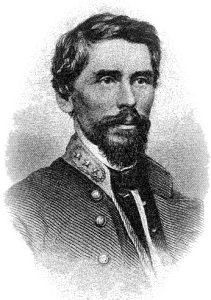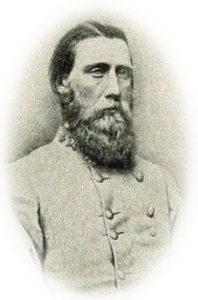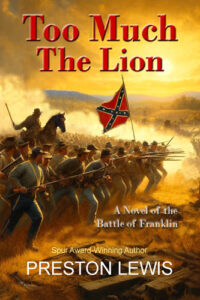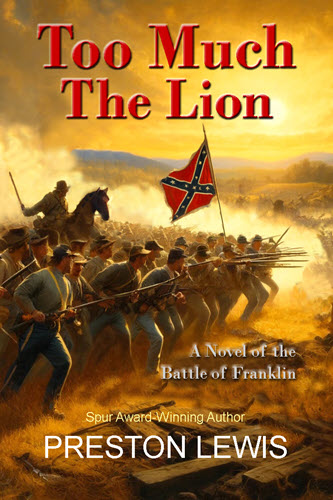A Good Beginning
 Over the years, I’ve written close to sixty books, but never have I penned a beginning sentence I am prouder of than the one that opens Too Much the Lion: A Novel of the Battle of Franklin, which is scheduled for a May 13 release.
Over the years, I’ve written close to sixty books, but never have I penned a beginning sentence I am prouder of than the one that opens Too Much the Lion: A Novel of the Battle of Franklin, which is scheduled for a May 13 release.
“Like the unceasing tears of the dying Confederacy, the November raindrops fell cold and bitter against his cheeks,” begins Too Much the Lion. The man referred to in the sentence is Major General Patrick Ronayne Cleburne, the nominal hero of the book and an honorable but long forgotten Confederate hero.
To me the sentence captures the weariness and fate of the Confederacy after three and a half years of war. Too Much the Lion focuses on the five days leading up to the tragic Battle of Franklin on November 30, 1864, and its heartrending aftermath.
 The villain is Confederate Lieutenant General John Bell Hood, a pugnacious fighter but a crippled man whose responsibilities far exceeded his talent as commander of the Army of Tennessee. The strained interplay between Cleburne and Hood, whose hubris is ultimately fatal to thousands of men under his charge, is the thread that runs through the historical novel.
The villain is Confederate Lieutenant General John Bell Hood, a pugnacious fighter but a crippled man whose responsibilities far exceeded his talent as commander of the Army of Tennessee. The strained interplay between Cleburne and Hood, whose hubris is ultimately fatal to thousands of men under his charge, is the thread that runs through the historical novel.
Too Much the Lion is written in the style of the Pulitzer Prize-winning novel The Killer Angels by Michael Shaara, which focuses on the Battle of Gettysburg and the ill-fated Pickett’s Charge, often called the “high tide of the Confederacy.”
Both books provide vignettes of actual historical figures in the encounters, though The Killer Angels covers the battle from both Union and Confederate military viewpoints. My novel follows only the Confederate side from the point of view of generals, soldiers, Franklin civilians and slaves affected by the encounter. Originally, I had envisioned more Union viewpoints, but felt it would make the novel too long, coming in at 108,500 words as it is just focusing on the Southern side.
While Pickett’s Charge is the most famous frontal assault in Civil War history, the attack at Franklin actually covered twice as much ground with twice as many soldiers as did the Gettysburg storming. And, when the gunfire ended, the Franklin Confederates held their objective, though not without a fearsome cost that eviscerated the Army of Tennessee as an effective fighting force.
Preliminary reviews have been highly laudatory:
 Kirkus Reviews wrote, “As a clash becomes inevitable and tensions rise, Lewis examines it from multiple angles, with the important inclusion of two enslaved people, which emphasizes that the Confederacy was “a slave to the idea of slavery as a way of life.” Most poignant is the story of Henry B. Free, whose surname Lewis invented, as records did not grant the real man a surname. The book would likely have benefited from presenting Union soldiers’ perspectives on events, as well. However, Lewis’ intense historical research shines through in his inclusion of military movements, maps, and photographs, which give the work the feel of a history book. His prose is also often vivid, highlighting war’s futility and bringing to life the sights, sounds, and smells of the battlefield (“The stench of gunpowder mingled with the odor of the viscera the powder had created”). A fast-paced, well-researched work that will particularly appeal to military history enthusiasts.”
Kirkus Reviews wrote, “As a clash becomes inevitable and tensions rise, Lewis examines it from multiple angles, with the important inclusion of two enslaved people, which emphasizes that the Confederacy was “a slave to the idea of slavery as a way of life.” Most poignant is the story of Henry B. Free, whose surname Lewis invented, as records did not grant the real man a surname. The book would likely have benefited from presenting Union soldiers’ perspectives on events, as well. However, Lewis’ intense historical research shines through in his inclusion of military movements, maps, and photographs, which give the work the feel of a history book. His prose is also often vivid, highlighting war’s futility and bringing to life the sights, sounds, and smells of the battlefield (“The stench of gunpowder mingled with the odor of the viscera the powder had created”). A fast-paced, well-researched work that will particularly appeal to military history enthusiasts.”
D. Donovan, senior reviewer, Midwest Book Review, commented, “Too Much the Lion: A Novel of the Battle of Franklin is a historical Civil War novel that narrows its focus to the five days leading up to the Battle of Franklin on November 30, 1864. Readers need no prior insights into this particular battle in order to appreciate the vivid “you are here” feel of the times, which gives Too Much the Lion a thoroughly absorbing attraction to Civil War buffs and general-interest history readers alike….The saga opens on a Saturday and concludes six days later on a Thursday. Readers might initially think this short span of time will translate to a simple read—but they’d be wrong. Much action, many confrontations, and thought-provoking dilemmas take place within this short period of time, giving Too Much the Lion an extraordinary air of thought-provoking, fast-paced events….Staying true to historical accuracy while building a fictional overlay of drama and everyday events is no light challenge, but Preston Lewis provides engrossing, thought-provoking passages that achieve both objectives…”
Kirkus Reviews further honored Too Much the Lion by selecting the online review to be included in the upcoming May 15 issue of Kirkus Reviews magazine. Less than 25% of reviews of self- or independently-published books are accorded this recognition. Too Much the Lion is being published by Bariso Press, Harriet’s and my imprint.

